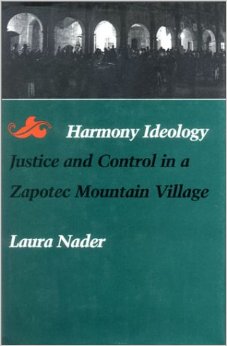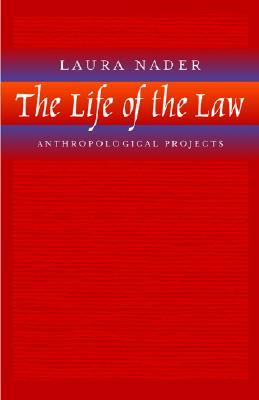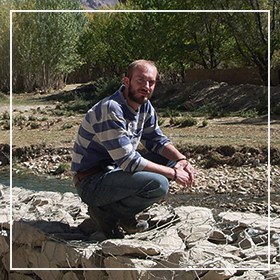Laura Nader is Professor of Anthropology at the University of California, Berkeley. Nader’s current work focuses on how central dogmas are made and how they work in law, energy science, and anthropology. Harmony, Ideology, Injustice and Control in a Mountain Zapotec Village (1990) and The Life of the Law: Anthropological Projects (2002) indicate a wide range of interests in law that has moved from village sites into national and international arenas. Essays in Controlling Processes (1994, 1996, 2002) is an ongoing work that attempts to synthesize contemporary work on power and control. In 2008 Plunder – When the Rule of Law is Illegal was co-authored with Ugo Mattei. In 2012 she published Culture and Dignity: Dialogues Between the Middle East and the West (see book review here) in which she questions apparent clashes between human groups and she clenches the hybrid cultural dimension in which we all live.
 Antonio: You have recently attended the 112th annual meeting of the American Anthropological Association in Chicago. Allegra has published a critical post-AAA note in which emerge some of the concerns related to this important (yet ambivalent) event. What is your post-AAA feeling? How have you seen the AAA changing over the years?
Antonio: You have recently attended the 112th annual meeting of the American Anthropological Association in Chicago. Allegra has published a critical post-AAA note in which emerge some of the concerns related to this important (yet ambivalent) event. What is your post-AAA feeling? How have you seen the AAA changing over the years?
Laura: Needless to say the AAA has changed tremendously in the past 50 some years. As with other professional associations the size has increased. When I first attended there were something over 1000 plus people attending. In Chicago some 7000 attendees. Along with the expansion has come changes in the organization of the meetings – now planned by corporate structures. Regarding the content Eric Wolf said it well: “They subdivide and subdivide and call it anthropology”. Too much sub-specialties without linking to the larger whole, not enough comparison. Layers of unintelligible language. I recall at the Boston meetings years ago one could submit papers for an all day panel on selected bests from all parts of anthropology. A good idea we might want to try. It might also give us more public (e.g. newspapers, TV) exposure.
Antonio: You started to study anthropology with Clyde Kluckhohn at Harvard. What did push you to approach anthropology?
Laura: As a senior in college I specialized in Latin American literature and history and wrote an honors paper on Mexican Revolutionary Novels which was not accepted because it appeared more sociological and less literary criticism – a week before graduation. The president had to award me a special degree in Latin American Studies, and my older brother who was studying anthropology at the University of Toronto sent me a copy of Clyde Kluckhohn’s Mirror for Man. I read it and realized I think like an anthropologist. I went to Harvard to study with Kluckhohn. He had scope, knew what a big anthropology was – something more than the head of a pin.
Antonio: You joined Berkeley in 1960 as the first woman to receive a tenure track position in the Department. But I guess you had difficult  moments anyway…
moments anyway…
Laura: Yes. I was the first woman hired on tenure track at Berkeley anthropology. I had 3 children and not one day of maternity leave, I was told by Sherry Washburn I had to publish more than the men. I never got equal pay with male counterparts. Over the past half century the country has moved to the right, the university has become corporatized. Football and coach’s salaries have gone sky high, academic priorities to one side. Anthropology faculty has shrunken. Campus wants more quantification. I invented a course, Controlling Processes, (see the the Mintz Lecture) to help students understand their immediate world – a 300 sized class which I taught for over 25 years. No departmental support for innovative pedagogy. I now teach a large course on Energy also well-attended.
Antonio: In the past decades anthropologists have increasingly assumed the burden to contrast power and to “do something” in favor of those in the margins. In a kind of paradoxical movement, while anthropologists have produced harsh critique against humanitarianism and development, they have themselves set up a philanthropic mission to the point that nowadays it is difficult to separate anthropology from this solidaristic attitude. Of course a series of questions arises here, both in terms of ethical and scientific dilemmas…
Laura: Anthropologists are usually heavily influenced by the culture of which they are a part in this case a culture (the US) with a salvation mentality. There are exceptions – the Occupy movement called attention to economic inequalities – heavily influenced by the efforts of David Graeber. Nancy Scheper-Hughes examining the last commodity – buying and selling body parts, Gillian Tett on derivatives as Fool’s Gold, Roberto Gonzalez, Hugh Gusterson, David Price on the American military, and most recently Akhbar Ahmed’s tour de force The Thistle and the Drone – a brilliant analysis of drones and their consequences for Islamic mountain peoples. All is not lost.
Antonio: Humanities and social sciences are today challenged by sterile instruments of scientific measurement that aim at evaluating the work of scholars according to bureaucratic/arithmetic parameters. I see this process very much connected to other drifts affecting the academic realm such as the glorification of the idea of “efficiency”, the search for profit, the transformation of students into clients, the idea that research and study must be at all costs useful and serviceable (for immediate purposes). Where all this will bring us?
 Laura: All of this brings us to a dead-end unless a few people decide to do something collectively, meaning across the social sciences. This would include people like Benjamin Ginsberg’s (see The Fall of the Faculty: The Rise of the All-Administrative University and Why it Matters). Or Greg Lukanoff (see Unlearning Liberty: Campus Censorship and the End of the American Debate).
Laura: All of this brings us to a dead-end unless a few people decide to do something collectively, meaning across the social sciences. This would include people like Benjamin Ginsberg’s (see The Fall of the Faculty: The Rise of the All-Administrative University and Why it Matters). Or Greg Lukanoff (see Unlearning Liberty: Campus Censorship and the End of the American Debate).
Antonio: An undergrad student asked me a few days ago some advices for her MA studies. Why anthropology? She asked me. Would you help me giving her an answer?
Laura: For me anthropology is the freest of scientific endeavors because it potentially does not stop at boundaries that interfere with the capacity of the mind for self-reflection. This is a moment for new syntheses in a world that is both interconnected and disconnected, on a planet where long term survival is at risk. Anthropologists should not shrink from the big questions. We have a large part to play.
Watch Laura Nader’s presentation of Culture and Dignity at UC Berkeley






Culture and dignity are to be brought forward at Women’s forums ! There are so many “artificial” boundaries we need to cross to come to the true cultural dignity!
I’m just discovering allegralaboratory.net and rediscovering for the tenth or eleventh time my love of the Naders, Laura and Ralph. Laura’s Contrarian Anthropology (2018) has some quotable sentences and interesting arguments on most of its 489 pages and I’ll be ordering 3 more copies to give to my grandaughters in hopes that they will want to “think like an anthropologist” for the rest of their lives.